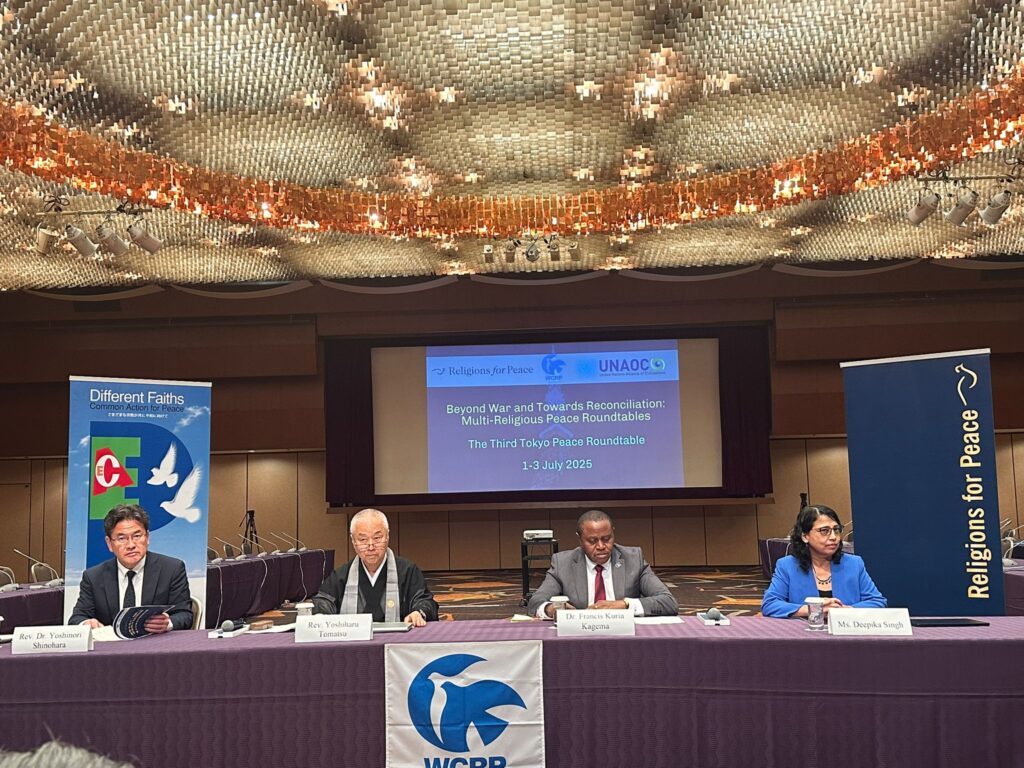The Third Tokyo Peace Roundtable, a landmark initiative to build a global framework for reconciliation and peace, kicks off on July 1 in Tokyo. Co-organized by Religions for Peace International, Religions for Peace Japan, and the United Nations Alliance of Civilizations, the gathering brings together 50 religious leaders from 11 countries and five major religious traditions—Buddhism, Christianity, Hinduism, Judaism, and Islam.

The press conference of presentation of the roundtable, on Monday morning, stated that this year’s event is especially significant, as it welcomes religious leaders from conflict-affected regions including Russia, Ukraine, and Myanmar. Despite the ongoing turmoil in the Middle East that prevent their participation, religious representatives from Israel and Palestine contributed video messages, reaffirming their commitment to dialogue and peacebuilding. “We gather in our persistent search for peace, a search that will not stop until we achieve the objective of ending wars. For truly, peace is not a moment or event, but a persistent choice, renewed every day through dialogue, courage, and cooperation,” said Dr. Francis Kuria, Secretary General of Religions for Peace, opening the press conference.
Deputy Secretary General Deepika Singh introduced the program and welcomed the distinguished participants, including Metropolitan Yevstratiy Zoria, Metropolitan of Bila Tserkva, Ukraine; Mr. Vakhtang Kipshidze, Deputy Chairman, Russian Orthodox Church; H.E. Mufti Albir-Hazrat Krganov, Head, Spiritual Assembly of Muslims of Russia; H.E. Chief Rabbi Yaakov Dov Bleich, Chief Rabbi of Kyiv and Ukraine; H.E. Cardinal Charles Bo, Archbishop of Yangon and Co-President, Religions for Peace; Dr. Yin Yin Maw, Secretary General, Religions for Peace Myanmar and several senior religious leaders from Japan.
On July 2, the delegation will convene at the International Conference Room in Japan’s House of Representatives for a high-level dialogue with members of the National Diet (the Japanese Congress). The meeting will focus on securing political support for long-term peace initiatives, including a proposed program extending through 2030. Key topics will include conflict resolution, reconciliation, and humanitarian support.
Rev. Yoshiharu Tomatsu, Chairman of Religions for Peace Japan, reiterated the movement’s core belief that “Peace cannot be achieved through military action. A ‘peace’ achieved by force is not peace at all. True peace must be rooted in dialogue, empathy, and love.”
During the press conference, Rev. Dr. Yoshinori Shinohara, Secretary General of Religions for Peace Japan, emphasized the importance of sustained commitment and political engagement. Participants collectively underscored the need for restorative justice—accountability for wrongdoers and healing for victims—as well as the enduring values of patience, perseverance, and shared human dignity. As the world faces escalating conflicts and humanitarian crises, the Tokyo Peace Roundtable stands as a beacon of hope, reminding us that religions can play a vital role in diplomacy and peacebuilding.
Originally uploaded at Religious Leaders Unite in Tokyo for Peace in Ukraine and Russia – Religions for Peace

Tokyo, June 30, 2025 — The Third Tokyo Peace Roundtable’s Press Conference
The press conference of presentation of the roundtable, on Monday morning, stated that this year’s event is especially significant, as it welcomes religious leaders from conflict-affected regions including Russia, Ukraine, and Myanmar. Despite the ongoing turmoil in the Middle East that prevent their participation, religious representatives from Israel and Palestine contributed video messages, reaffirming their commitment to dialogue and peacebuilding. “We gather in our persistent search for peace, a search that will not stop until we achieve the objective of ending wars. For truly, peace is not a moment or event, but a persistent choice, renewed every day through dialogue, courage, and cooperation,” said Dr. Francis Kuria, Secretary General of Religions for Peace, opening the press conference.
Deputy Secretary General Deepika Singh introduced the program and welcomed the distinguished participants, including Metropolitan Yevstratiy Zoria, Metropolitan of Bila Tserkva, Ukraine; Mr. Vakhtang Kipshidze, Deputy Chairman, Russian Orthodox Church; H.E. Mufti Albir-Hazrat Krganov, Head, Spiritual Assembly of Muslims of Russia; H.E. Chief Rabbi Yaakov Dov Bleich, Chief Rabbi of Kyiv and Ukraine; H.E. Cardinal Charles Bo, Archbishop of Yangon and Co-President, Religions for Peace; Dr. Yin Yin Maw, Secretary General, Religions for Peace Myanmar and several senior religious leaders from Japan.
On July 2, the delegation will convene at the International Conference Room in Japan’s House of Representatives for a high-level dialogue with members of the National Diet (the Japanese Congress). The meeting will focus on securing political support for long-term peace initiatives, including a proposed program extending through 2030. Key topics will include conflict resolution, reconciliation, and humanitarian support.
Rev. Yoshiharu Tomatsu, Chairman of Religions for Peace Japan, reiterated the movement’s core belief that “Peace cannot be achieved through military action. A ‘peace’ achieved by force is not peace at all. True peace must be rooted in dialogue, empathy, and love.”
During the press conference, Rev. Dr. Yoshinori Shinohara, Secretary General of Religions for Peace Japan, emphasized the importance of sustained commitment and political engagement. Participants collectively underscored the need for restorative justice—accountability for wrongdoers and healing for victims—as well as the enduring values of patience, perseverance, and shared human dignity. As the world faces escalating conflicts and humanitarian crises, the Tokyo Peace Roundtable stands as a beacon of hope, reminding us that religions can play a vital role in diplomacy and peacebuilding.
Originally uploaded at Religious Leaders Unite in Tokyo for Peace in Ukraine and Russia – Religions for Peace
